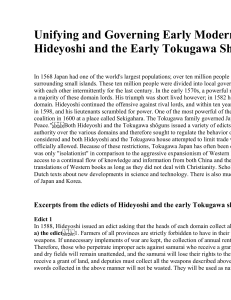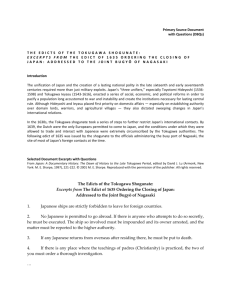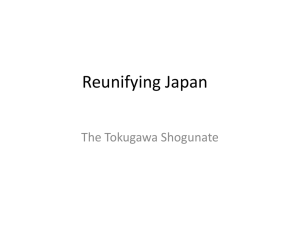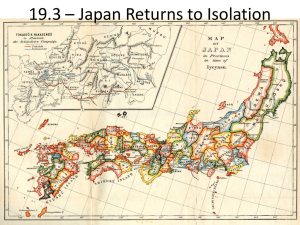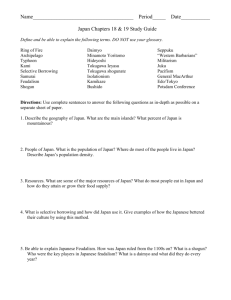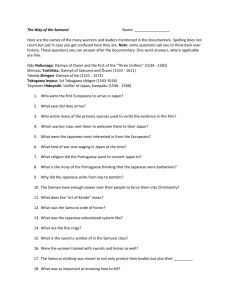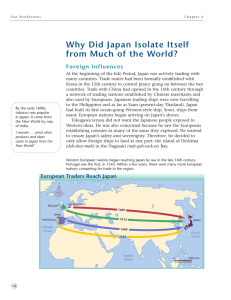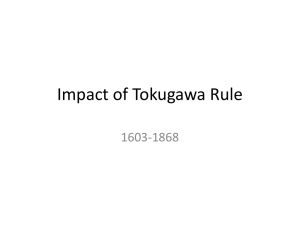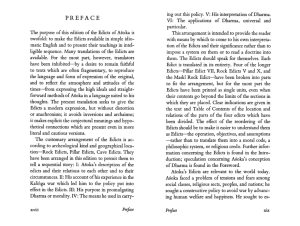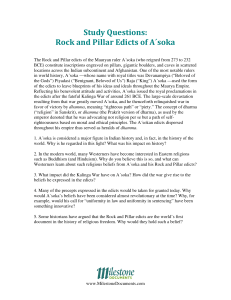Excerpts from the edicts of Hideyoshi and the early Tokugawa
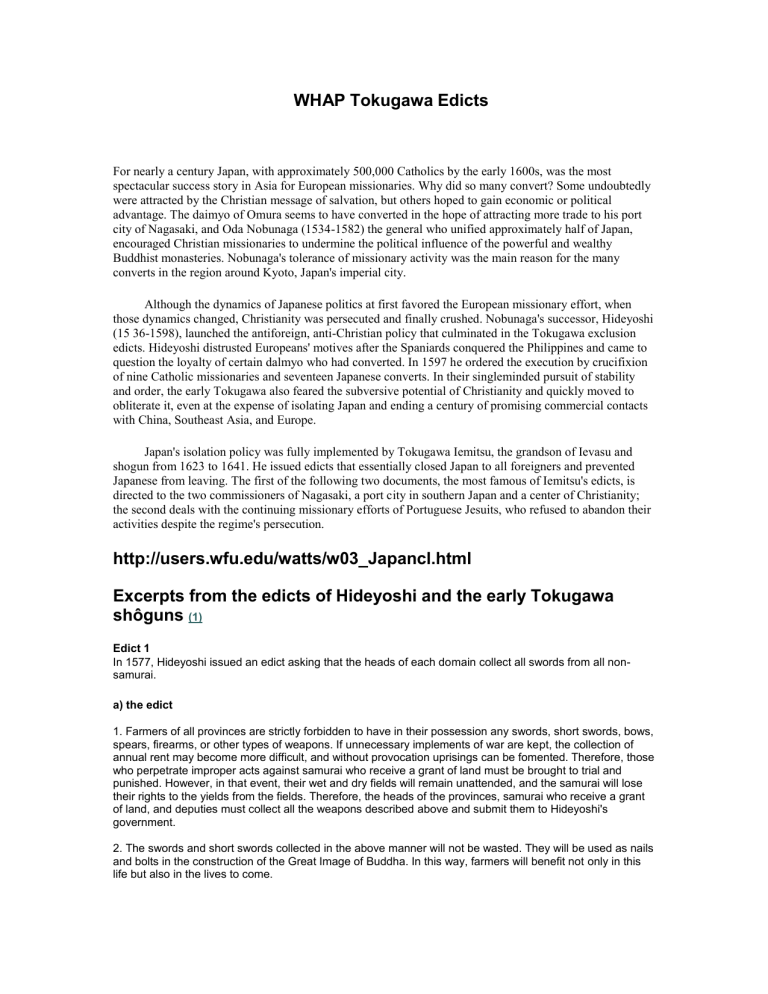
WHAP Tokugawa Edicts
For nearly a century Japan, with approximately 500,000 Catholics by the early 1600s, was the most spectacular success story in Asia for European missionaries. Why did so many convert? Some undoubtedly were attracted by the Christian message of salvation, but others hoped to gain economic or political advantage. The daimyo of Omura seems to have converted in the hope of attracting more trade to his port city of Nagasaki, and Oda Nobunaga (1534-1582) the general who unified approximately half of Japan, encouraged Christian missionaries to undermine the political influence of the powerful and wealthy
Buddhist monasteries. Nobunaga's tolerance of missionary activity was the main reason for the many converts in the region around Kyoto, Japan's imperial city.
Although the dynamics of Japanese politics at first favored the European missionary effort, when those dynamics changed, Christianity was persecuted and finally crushed. Nobunaga's successor, Hideyoshi
(15 36-1598), launched the antiforeign, anti-Christian policy that culminated in the Tokugawa exclusion edicts. Hideyoshi distrusted Europeans' motives after the Spaniards conquered the Philippines and came to question the loyalty of certain dalmyo who had converted. In 1597 he ordered the execution by crucifixion of nine Catholic missionaries and seventeen Japanese converts. In their singleminded pursuit of stability and order, the early Tokugawa also feared the subversive potential of Christianity and quickly moved to obliterate it, even at the expense of isolating Japan and ending a century of promising commercial contacts with China, Southeast Asia, and Europe.
Japan's isolation policy was fully implemented by Tokugawa Iemitsu, the grandson of Ievasu and shogun from 1623 to 1641. He issued edicts that essentially closed Japan to all foreigners and prevented
Japanese from leaving. The first of the following two documents, the most famous of Iemitsu's edicts, is directed to the two commissioners of Nagasaki, a port city in southern Japan and a center of Christianity; the second deals with the continuing missionary efforts of Portuguese Jesuits, who refused to abandon their activities despite the regime's persecution.
http://users.wfu.edu/watts/w03_Japancl.html
Excerpts from the edicts of Hideyoshi and the early Tokugawa shôguns
(1)
Edict 1
In 1577, Hideyoshi issued an edict asking that the heads of each domain collect all swords from all nonsamurai. a) the edict
1. Farmers of all provinces are strictly forbidden to have in their possession any swords, short swords, bows, spears, firearms, or other types of weapons. If unnecessary implements of war are kept, the collection of annual rent may become more difficult, and without provocation uprisings can be fomented. Therefore, those who perpetrate improper acts against samurai who receive a grant of land must be brought to trial and punished. However, in that event, their wet and dry fields will remain unattended, and the samurai will lose their rights to the yields from the fields. Therefore, the heads of the provinces, samurai who receive a grant of land, and deputies must collect all the weapons described above and submit them to Hideyoshi's government.
2. The swords and short swords collected in the above manner will not be wasted. They will be used as nails and bolts in the construction of the Great Image of Buddha. In this way, farmers will benefit not only in this life but also in the lives to come.
3. If farmers possess only agricultural implements and devote themselves exclusively to cultivating the fields, they and their descendants will prosper. This compassionate concern for the well-being of the farms is the reason for the issuance of this edict, and such a concern is the foundation for the peace and security of the country and the joy and happiness of all the people. . . . b) commentary
All the swords possessed by farmers in this country have been collected for the ostensible purpose of making nails for the erecting of the Great Image of Buddha. . . . But truthfully, this is a measure specifically adopted to prevent occurrence of peasant uprisings. Indeed various motivations are behind this.
Edicts 2 and 3
Catholic missionaries from Spain and Portugal had arrived in Japan in the early sixteenth century to trade and to proselytize. In 1587, Hideyoshi found it necessary to limit the activities of these missionaries. In two different edicts he wrote:
Edict 2 excerpt
1. Whether one desired to become a follower of the padre is up to that person's own conscience.
2. If one receives a province, a district, or a village as his fief, and forces farmers in his domain who are properly registered under certain temples to become followers of the padre against their wishes, then he as committed a most unreasonable illegal act.
Edict 3 excerpt
1. Japan is the country of gods, but has been receiving false teachings from Christian countries. This cannot be tolerated any further.
2. The [missionaries] approach people in provinces and districts to make them their followers, and let them destroy shrines and temples. This is an unheard of outrage. When a vassal receives a province, a district, a village, or another form of a fief, he must consider it as a property entrusted to him on a temporary basis. He must follow the laws of this country, and abide by their intent. However, some vassals illegally [commend part of their fiefs to the church]. This is a culpable offense.
3. The padres, by their special knowledge [in the sciences and medicine], feel that they can at will entice people to become their believers. In doing so they commit the illegal act of destroying the teachings of
Buddha prevailing in Japan. These padre cannot be permitted to remain in Japan. They must prepare to leave the country within twenty days of the issuance of this notice. . . .
4. The black [Portuguese and Spanish] ships come to Japan to engage in trade. Thus the matter is a separate one. They can continue to engage in trade.
5. Hereafter, anyone who does not hinder the teachings of the Buddha, whether he be a merchant or not, may come and go freely from Christian countries to Japan.
Edict 4
In 1615, a year before the death of Tokugawa Ieyasu, the following laws governing military households were issued:
1.The study of literature and the practice of the military arts, including archery and horsemanship, must be cultivated diligently.
"On the left hand literature, on the right hand use of arms," was the rule of the ancients. Both must be pursued concurrently. Archery and horsemanship are essential skills for military men. It is said that war is a curse. However, it is resorted to only when it is inevitable. In time of peace, do not forget the possibility of disturbances. Train yourself and be prepared.
2. Avoid group drinking and wild parties. . . .
6. The castles in various domains may be repaired, provided the matter is reported without fail. New construction of any kind is strictly forbidden. . . .
8. Marriage must not be contracted in private [without approval from the bakufu]. . . . To form a factional alliance through marriage is the root of treason.
10. The regulations with regard to dress materials must not be breached. Lords and vassals, superiors and inferiors, must observe what is proper within their positions in life. Without authorization, no retainer may indiscriminately wear fine white damask, white wadded silk garments, purple silk kimono, purple silk linings, and kimono sleeves which bear no family crest. . . .
12. The samurai of all domains must practice frugality. When the rich proudly display their rich, the poor are ashamed of not being on par with them. There is nothing which will corrupt public morality more than this, and therefore it must be severely restricted.
13. The lords of the domains must select as their officials men of administrative ability. The way of governing a country is to get the right men. If the lord clearly discerns between the merits and faults of his retainers, he can administer due rewards and punishments. If the domain has good men, it flourishes more than ever. If it has no good men, it is doomed to perish. This is an admonition which the wise men of old bequeathed to us.
Take heed and observe the purport of the foregoing rules. First year of Genna [1615], seventh month.
Edict 5
The following regulations, written in 1635, concern contact with foreigners. They were addressed to the officials at Nagasaki, a major trading port.
1. Japanese ships are strictly forbidden to leave for foreign countries.
2. No Japanese is permitted to go abroad. If there is anyone who attempts to do so secretly, he must be executed. The ship so involved must be impounded and its owner arrested, and the matter must be reported to the higher authority.
3. If any Japanese returns from overseas after residing there, he must be put to death.
4. If there is any place where the teachings of padres (Christianity) is practiced, the two of you must order a thorough investigation. . . .
7. If there are any Southern Barbarians (Westerners) who propagate the teachings of padres, or otherwise commit crimes, they may be incarcerated in the prison maintained by the Omura domain, as was done previously. . . .
10. Samurai are not permitted to purchase any goods originating from foreign ships directly from Chinese merchants in Nagasaki.
(1) These excerpts were taken from David Lu, ed., Japan: A Documentary History , Armonk: M. E. Sharpe,
1997, pp. 191-92, 196-97, 206-08, 221-22.
Exclusion of the Portuguese, 1639
….hereafter entry by the Portuguese galeota (Spanish Galleon) is forbidden. If they insist of coming [ to
Japan] their ships must be destroyed and anyone aboard those ships must be beheaded.
….you are not permitted to let padres and those who believe in their preachings to come abroad your ships.
If there is any violation all of you aboard will be considered culpable. If there is anyone who hides the fact that he is a Christian and boards your ship, you may report it to us. A substantial reward will be given for this information.
Discussion Questions
Edict 1
1. Hideyoshi gives two different reasons for forbidding farmers to keep swords. What were they? Why do you think he felt he needed to give both?
Edicts 2 and 3
2. How would you characterize Hideyoshi's attitude towards the Catholic missionaries? How would you imagine a conversation between Hideyoshi and one of the Portuguese missionaries?
Edict 4
3.The rules governing the military households cover a wide range of topics: the proper course of study, drinking, construction of castles, marriage, proper dress, frugality, and the method of selecting officials.
Imagine that you are one of the Tokugawa advisors who made up this list of rules. Tomorrow you must present the laws to Tokugawa Ieyasu for review. Write one or two arguments for the inclusion of each of the laws.
Edict 5
4. What reasons could be given for forbidding citizens from traveling abroad?
5. Compare the attitude towards Christianity in the 1635 Tokugawa edict and the 1587 edicts of Hideyoshi's rule.
6. For what reason was foreign trade restricted, especially in regards to the Samurai?
7. Hypothesize why the Japanese government made a proclamation of death to arriving “padres”.
8. In your opinion, why was the Japanese government so hostile to Christianity?
9. What have been the effects of the Edicts, both short term to the present day?
10. How might Japan’s history have been different if they had instead embraced foreign relations, trade and culture.
